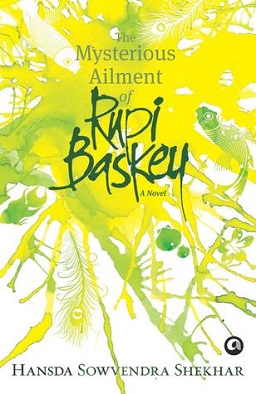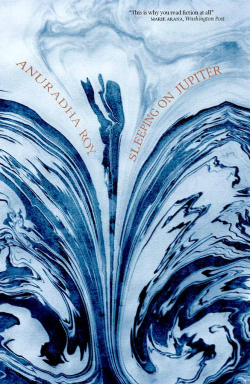
Amitav Ghosh is an Indian writer. He won the 54th Jnanpith award in 2018, India's highest literary honor. Ghosh's ambitious novels use complex narrative strategies to probe the nature of national and personal identity, particularly of the people of India and South Asia. He has written historical fiction and also written non-fiction works discussing topics such as colonialism and climate change.
Tabish Khair is an Indian English author and associate professor in the Department of English, University of Aarhus, Denmark. His books include Babu Fictions (2001), The Bus Stopped (2004), which was shortlisted for the Encore Award (UK) and The Thing About Thugs (2010), which has been shortlisted for a number of prizes, including the DSC Prize for South Asian Literature and the Man Asian Literary Prize. His poem Birds of North Europe won first prize in the sixth Poetry Society All India Poetry Competition held in 1995. In 2022, he published a new Sci Fi novel, [The Body by the Shore].

The Glass Palace is a 2000 historical novel by Indian writer Amitav Ghosh. The novel is set in Burma, Bengal, India, and Malaya, spans a century from the Third Anglo-Burmese War and the consequent fall of the Konbaung Dynasty in Mandalay, through the Second World War to late 20th century. Through the stories of a small number of privileged families, it illuminates the struggles that have shaped Burma, India and Malaya into the places they are today. It explores the various facets of the colonial period, including the economic fall of Burma, the rise of timber and rubber plantations, the moral dilemmas faced by Indians in the British Indian Army, and the devastating effects of World War II. Focusing mainly on the early 20th Century, it explores a broad range of issues ranging from the changing economic landscape of Burma and India, to pertinent questions about what constitutes a nation and how these change as society is swept along by the tide of modernity.

Anjum Hasan is an Indian novelist, short story writer, poet, and editor. She graduated in philosophy from North-Eastern Hill University in Shillong, Meghalaya. She currently lives in Bangalore, Karnataka, India.

Literature from North East India (Assamese: উত্তৰ-পূৱ ভাৰতৰ সাহিত্য is literature in the languages of North East India and the body of work by English-language writers from this region. North East India is an under-represented region in many ways. The troubled political climate, the beautiful landscape and the confluence of various ethnic groups perhaps have given rise to a body of writing that is completely different from Indian English literature. North-East India was a colonial construct and continues to be one by virtue of having a historically difficult relationship with the Indian nation state.
The Crossword Book Award is an Indian book award hosted by Crossword Bookstores and their sponsors. The Award was instituted in 1998 by Indian book retailer Crossword with the intention of competing with The Booker Prize, Commonwealth Writers' Prize or The Pulitzer Prize.

River of Smoke (2011) is a novel by Indian novelist Amitav Ghosh. It is the second volume of the Ibis trilogy.
Anuradha Roy is an Indian novelist, journalist and editor. She has written five novels: An Atlas of Impossible Longing (2008), The Folded Earth (2011), Sleeping on Jupiter (2015), All the Lives We Never Lived (2018), and The Earthspinner (2021).
The Ibis trilogy is a work of historical fiction by Indian writer Amitav Ghosh, consisting of the novels Sea of Poppies (2008), River of Smoke (2011) and Flood of Fire (2015). A work of postcolonial literature, the story is set across the Indian Ocean region during the 1830s in the lead-up to the First Opium War. It particularly focuses on the trade of opium between India and China and the trafficking of girmityas to Mauritius. The series has received critical acclaim and academic attention for its historical research, themes and ambition. A television series adaptation was announced to be in development in 2019.
Anees Salim is an Indian author known for his books like Vanity Bagh, The Blind Lady's Descendants and the Small Town Sea. He is from the town of Varkala, and now lives in Kochi, Kerala. He won the Sahitya Akademi Award for The Blind Lady's Descendants in 2018, becoming only the fourth Malayalee in history to win the award for an English work. Some of his columns have appeared in newspaper The Indian Express.

Lit for Life is an annual literary festival organised by the English daily The Hindu in Chennai, India. The festival was inaugurated in 2010, where it was part of the celebration of the 20th anniversary of The Hindu's Literary Review. In 2011 the Lit for Life became an independent one-day event. It has over the years developed into a three-day festival of literature and thought, featuring notable authors and speakers from all over the world. In 2020, the festival, that always takes place in mid-January, will celebrate its 10th anniversary. Main initiator and organiser of the Lit for Life is Dr Nirmala Lakshman, Director of The Hindu Group of Publications, and Chairperson of the Board of The Hindu Tamil.

Flood of Fire is a 2015 novel by Indian novelist Amitav Ghosh. Following the Sea of Poppies (2008) and River of Smoke (2011), the novel is the final installment of the Ibis trilogy, which concerns the 19th-century opium trade between India and China. The book was first published by the English publisher John Murray, and later by Farrar, Straus and Giroux in the United States. The novel was shortlisted for The Hindu Literary Prize and received the Crossword Book Jury Award in Fiction in 2015.
Hansda Sowvendra Shekhar is an Indian writer.

The Adivasi Will Not Dance: Stories is a collection of short stories. The second book by Hansda Sowvendra Shekhar, it was nominated for The Hindu Literary Prize in 2016 and included by Frontline (magazine) in August 2022 in a list of 25 books “that light up the path to understanding post-Independence Indian literature.” As of April 2021, this book has been translated into Hindi, Marathi, Tamil, Gujarati, and Bengali, while the Malayalam and Austrian German translations are forthcoming.
JCB Prize for Literature is an Indian literary award established in 2018. It is awarded annually with ₹2,500,000 (US$31,000) prize to a distinguished work of fiction by an Indian writer working in English or translated fiction by an Indian writer. The winners will be announced each November with shortlists in October and longlists in September. It has been called "India's most valuable literature prize". Rana Dasgupta is the founding Literary Director of the JCB Prize. In 2020, Mita Kapur was appointed as the new Literary Director.

The Mysterious Ailment of Rupi Baskey is a novel by Indian author Hansda Sowvendra Shekhar. Published in the year 2014, this was his first book. For this novel, Shekhar won the 2015 Yuva Puraskar, was shortlisted for the 2014 Crossword Book Award and the 2014 Hindu Literary Prize, longlisted for the 2016 International Dublin Literary Award, and jointly won the 2015 Muse India Young Writer Award. As of December 2019, this book has been translated into Tamil and Bengali. The Mysterious Ailment of Rupi Baskey was named by The Hindu in December 2019 as one of the ten best fiction books of the decade.

Amandeep Sandhu is a Punjabi writer and journalist who writes in English. His second novel Roll of Honour was nominated for Hindu Literary Prize for Best Fiction in 2013.

Sleeping on Jupiter is a novel by Anuradha Roy. It is her third novel and was published by Hachette India on 15 April 2015. It was longlisted for the 2015 Man Booker Prize and shortlisted for the 2015 The Hindu Literary Prize. It won the 2016 DSC Prize for South Asian Literature.

All the Lives We Never Lived is a novel by Anuradha Roy which was published on 14 May 2018 by Hachette India. In 2022, it was awarded the Sahitya Akademi Award.
 Serious Men , Manu Joseph [4] [5]
Serious Men , Manu Joseph [4] [5]  The Sly Company of People Who Care by Rahul Bhattacharya [7] [8]
The Sly Company of People Who Care by Rahul Bhattacharya [7] [8]  Em and the Big Hoom by Jerry Pinto
Em and the Big Hoom by Jerry Pinto  Vanity Bagh, Anees Salim [12]
Vanity Bagh, Anees Salim [12]  The Book of Common Signs, Ashok Srinivasan [14]
The Book of Common Signs, Ashok Srinivasan [14]  When the River Sleeps, Easterine Kire [16]
When the River Sleeps, Easterine Kire [16]  Jinnah Often Came To Our House, Kiran Doshi [18]
Jinnah Often Came To Our House, Kiran Doshi [18]  Temporary People, Deepak Unnikrishnan [20]
Temporary People, Deepak Unnikrishnan [20]  Requiem in Raga Janki, Neelum Saran Gour
Requiem in Raga Janki, Neelum Saran Gour  Interrogating my Chandal Life: An Autobiography of a Dalit, Manoranjan Byapari, translated from Bengali by Sipra Mukherjee
Interrogating my Chandal Life: An Autobiography of a Dalit, Manoranjan Byapari, translated from Bengali by Sipra Mukherjee Tell Her Everything, Mirza Waheed
Tell Her Everything, Mirza Waheed  India, Empire, and First World War Culture, Santanu Das
India, Empire, and First World War Culture, Santanu Das 










